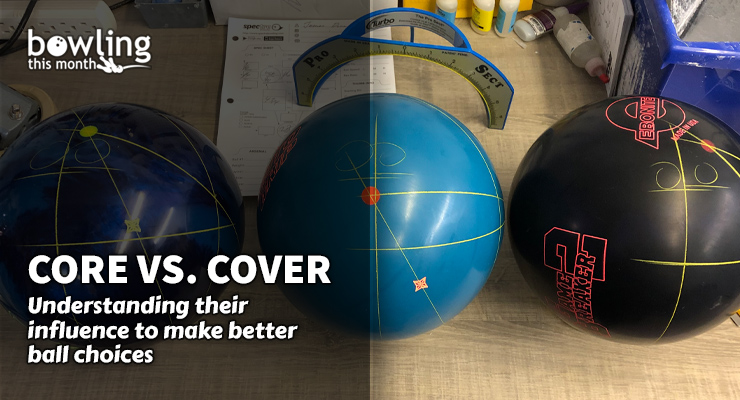Article Contents
- 1. Coverstock
- 2. Core
- 3. How does the core influence the cover, and vice versa?
- 3.1. All other things equal
- 3.2. A note on urethane
- 4. What to look for when buying a ball
- 4.1. Let’s answer some of our earlier questions
- 5. Conclusion
Note: This article is only available to Bowling This Month subscribers.
In today’s game, almost every bowling ball has some kind of dynamic core. Even polyester balls aren’t left out, as we’ve seen several examples of asymmetrical cores inside these coverstocks. What’s more, we often see coverstocks reused by companies around different cores, and vice versa, giving us a sort of mix-and-match game to find our favorite core and cover combinations. But what does this truly mean to our ball reaction? How do these two unique ball attributes combine to create a different whole? This article will tackle the difficult topic of core versus cover.
What is the relationship between the core and cover, and how does altering the surface and layout affect this relationship? First, we must understand them individually and how cores are affected by drilling, and how covers are affected by sanding/polishing.
Coverstock
When it comes to ball motion, the coverstock is the predominant factor. Depending on who you ask, you will get estimates that the coverstock is responsible for anywhere between 60 to 80 percent of ball motion. Even though the exact number might vary slightly from one person to the next, the important thing to know is that everyone agrees that the cover is the most important factor when it comes to ball motion. The USBC verified this in their ball motion study in 2008, as the top five most influential factors on ball motion were related to the coverstock.
The most common metaphor for bowling balls is the car metaphor, where the coverstock represents the tires, the part that touches the road or the lane. Racing slicks (i.e. polished balls) are not the same as snow tires with chains (i.e. extremely rough, oil-absorbent covers), and each has its own particular use. More on this later.
Core
Referring back to the car metaphor, think of the core as the motor in your car. Some engines are smaller ...
Already a premium member? Click here to log in.


